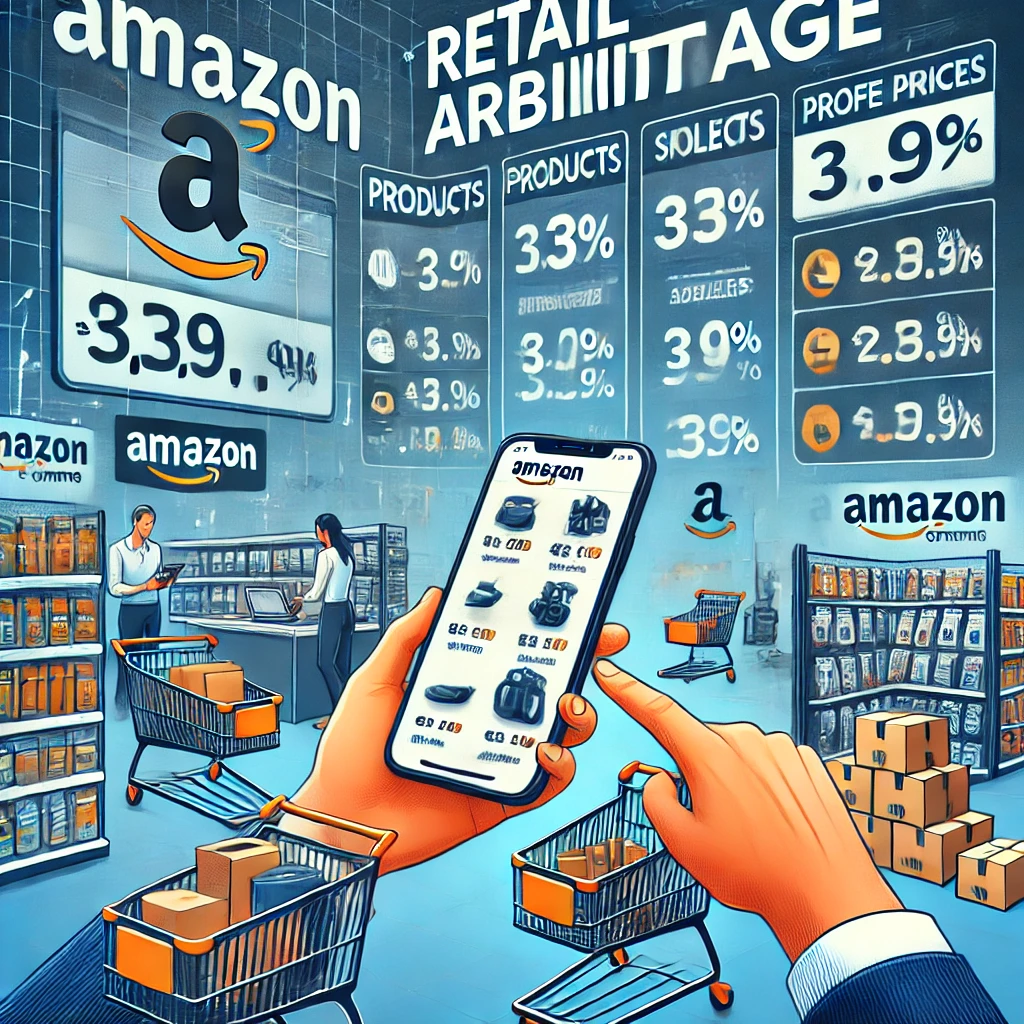If you’re interested in starting an Amazon e-commerce business but don’t have a large budget, Retail Arbitrage is one of the most accessible and budget-friendly ways to get started. The Retail Arbitrage Business Model involves purchasing products from retail stores at a discount and reselling them on Amazon for a profit. This model doesn’t require you to invest in manufacturing, branding, or creating your own products, making it ideal for those looking to break into e-commerce without a significant upfront investment.
In this post, we’ll explore the key benefits of choosing Retail Arbitrage as a launch strategy for your Amazon e-commerce business, especially if you’re working with a limited budget.
1. Low Startup Costs
The biggest advantage of Retail Arbitrage is its low startup cost, making it an ideal option for entrepreneurs who want to test the e-commerce waters without investing a lot of money upfront. With this model, you don’t need to invest in product development, branding, or inventory in bulk. You simply buy products at discounted prices from physical or online retail stores and resell them on Amazon for a profit.
How It Works:
- Sourcing Products: You visit retail stores (e.g., Walmart, Target, Ross, or discount stores) and scan items using the Amazon Seller App to find out if the item is being sold at a higher price on Amazon.
- Minimal Inventory Risk: Unlike other models that require you to purchase large quantities of inventory, Retail Arbitrage allows you to start small. You can buy one or two items at a time, reducing the financial risk.
- Quick Turnaround: Since you’re buying products that are already on the market, you can start selling them as soon as they’re listed on Amazon. There’s no need to wait for manufacturing or product development.
Benefits:
- No Need for Large Upfront Capital: You don’t need thousands of dollars to get started. You can begin with as little as $100, buying a few discounted items to resell.
- No Branding or Product Creation Costs: Retail Arbitrage removes the need for investing in product design, branding, and packaging, allowing you to focus solely on reselling.
Because the initial financial risk is so low, this model allows you to dip your toes into e-commerce without the pressure of needing a large budget. You can easily scale up once you start seeing returns.
2. Fast Entry Into the Market
Starting an Amazon business through Retail Arbitrage is one of the fastest ways to get up and running. Unlike Private Label or Wholesale models, which require time for product sourcing, manufacturing, or supplier negotiations, Retail Arbitrage lets you begin selling almost immediately.
How It Works:
- Instant Product Availability: You can source products locally or online and list them on Amazon within the same day. As soon as you find a product that’s profitable, it can be scanned, listed, and sold.
- No Need for Product Research Tools: While other models often require advanced tools like Jungle Scout or Helium 10 to conduct market research, Retail Arbitrage relies on scanning barcodes at stores to see if an item is profitable. This method makes it quick and easy to identify products that will sell well on Amazon.
Benefits:
- Immediate Access to Sellable Products: You can start generating sales within days, as long as you find the right products.
- Test the Market Quickly: Because you can list products right away, you can immediately start learning what works and what doesn’t, allowing you to make adjustments to your sourcing strategy without wasting time.
For anyone looking to launch their e-commerce business fast, Retail Arbitrage provides a swift, low-barrier entry into Amazon selling. There’s no need to wait months for product development or shipping.

3. Minimal Risk with Pay-As-You-Go Approach
Retail Arbitrage allows you to buy small amounts of inventory, minimizing risk while giving you the flexibility to grow your business gradually. This pay-as-you-go approach is perfect for entrepreneurs on a budget who want to avoid sinking a lot of money into unsold products.
How It Works:
- Purchase What You Can Afford: You only buy products in small quantities, allowing you to control your spending and minimize the financial risk. If a product doesn’t sell well, you haven’t invested heavily in it.
- Test the Waters: Retail Arbitrage lets you experiment with different product categories and brands without committing to large quantities. This enables you to learn which products perform best, refining your sourcing strategy over time.
Benefits:
- Less Financial Pressure: Unlike models that require a significant upfront investment, Retail Arbitrage allows you to start small and scale as you grow, reducing the pressure on your finances.
- Flexibility: You’re not locked into one product or one niche. If one item doesn’t perform well, you can move on to the next opportunity without suffering major losses.
- Reduced Inventory Risk: Because you’re not ordering inventory in bulk, there’s less risk of being stuck with unsold products.
This model gives new entrepreneurs the opportunity to learn the ins and outs of e-commerce without the heavy financial commitment that other business models often require.
4. Opportunity for Fast Cash Flow
Cash flow is critical when starting any business, and Retail Arbitrage offers the potential for quick cash flow due to the speed at which you can list and sell products.
How It Works:
- Quick Sales Cycles: Retail Arbitrage relies on finding products that are already popular or in demand, which means they can sell quickly once listed.
- Immediate Profit: Because you’re buying items at a discount and reselling them for a higher price, you can start generating profits quickly without waiting for a lengthy sales cycle.
Benefits:
- Cash Flow for Reinvestment: The faster you generate sales, the quicker you can reinvest the profits back into your business to source more products, ultimately scaling your inventory.
- Sustainable Growth: As your cash flow increases, you can gradually expand your product range and start looking for more profitable items, helping to grow your business over time.
With quick cash flow, Retail Arbitrage offers an excellent way to bootstrap your business, allowing you to reinvest profits and build up your inventory and operations steadily.
5. Learning the Ropes of Amazon Selling
Retail Arbitrage offers a valuable learning experience for anyone new to Amazon selling. By starting with this model, you can gain essential insights into how the Amazon platform works before transitioning into more complex models like Private Label or Wholesale.
What You’ll Learn:
- Product Research: You’ll become familiar with the process of researching products using the Amazon Seller App and understanding how to assess product profitability.
- Understanding Amazon’s Marketplace: Retail Arbitrage teaches you how Amazon’s marketplace operates, including how to create product listings, fulfill orders, manage customer service, and use Amazon’s Fulfillment by Amazon (FBA) program.
- Inventory Management: You’ll learn how to manage inventory levels, reorder stock, and avoid common pitfalls like stockouts or over-ordering.
- Pricing Strategies: By competing against other sellers on Amazon, you’ll gain a better understanding of how to set competitive prices while maintaining profitability.
Benefits:
- Foundation for Growth: By starting small, you can build a strong foundation of knowledge and experience, making it easier to expand into more scalable and profitable models in the future.
- Low-Stress Learning: Since Retail Arbitrage doesn’t require a massive upfront investment, you can afford to make mistakes and learn from them without risking a large sum of money.
This hands-on learning experience provides a solid foundation for those who eventually want to move into other Amazon business models, but it also offers enough potential for those who wish to stick with Retail Arbitrage long-term.
6. Flexibility and Independence
Retail Arbitrage offers incredible flexibility and can be adapted to fit into your lifestyle, making it a great option for side hustlers, part-time sellers, or those with other commitments.
How It Works:
- Set Your Own Schedule: Retail Arbitrage allows you to source products whenever it fits into your schedule. Whether it’s weekends, evenings, or during a lunch break, you can source products at your convenience.
- Work From Anywhere: As long as you have access to retail stores and online shopping platforms, you can run your business from almost anywhere. Plus, with Amazon handling shipping and customer service through FBA, you don’t need to worry about logistics.
- Scalability at Your Pace: You can scale up your business gradually by reinvesting profits and expanding your product sourcing activities. Whether you want to keep it as a side hustle or grow it into a full-time income stream, Retail Arbitrage offers the flexibility to do so.
Benefits:
- Work-Life Balance: Retail Arbitrage can fit into your schedule, giving you the freedom to work on your business without sacrificing your other commitments.
- Low Overhead: Since you don’t need to worry about warehousing or managing large amounts of inventory, your operational costs remain low, even as you grow.
This flexibility makes Retail Arbitrage ideal for new entrepreneurs, part-time sellers, or anyone looking for a way to build an e-commerce business without full-time commitment right away.
Conclusion: Launching Your Amazon Business on a Low Budget with Retail Arbitrage
For aspiring entrepreneurs who want to start an Amazon e-commerce business without a large budget, Retail Arbitrage is an excellent option. With its low startup costs, quick cash flow potential, and flexible operations, it provides a fast and relatively low-risk entry into the world of Amazon selling. While other models like Private Label or Wholesale require significant upfront investments, Retail Arbitrage allows





